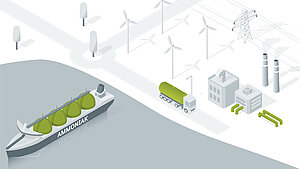With its largest research initiative to date on the subject of the energy transition, the Federal Ministry of Education and Research (BMBF) is supporting Germany's entry into the hydrogen economy. The three hydrogen lead projects are the result of an ideas competition and form a central contribution of the BMBF to the implementation of the National Hydrogen Strategy. Over a period of four years, they are intended to remove existing obstacles to Germany's entry into a hydrogen economy. This involves the series production of large-scale water electrolysers (H2Giga), the production of hydrogen and downstream products on the high seas (H2Mare) and technologies for the transport of hydrogen (TransHyDE).
The aim of TransHyDE is to answer all the questions that Germany still has to ask itself in order to build a national hydrogen infrastructure, whereby these questions must be answered in a scientifically and technically robust manner so that the foundations are laid for the real execution of the hydrogen turnaround.
One of these questions that still needs to be answered is how to recover pure hydrogen from ammonia. So far, there is no technology for reforming ammonia (NH3) that can be used on a large industrial scale. In the new TransHyDE research network "AmmoRef", the technological foundations are therefore to be researched and developed so that an environmentally friendly, economical and safe solution for future energy supply can be guaranteed. Central to this is the knowledge-based design of highly active catalysts that work stably and cost-effectively without precious metals. In addition, the development of an emission-free process with a sustainable energy supply, a high degree of material and thermal integration, and robust reactors with a high specific conversion rate is indispensable to create a technological basis.
Based on this technology and with the developed catalysts, variants for centralised and decentralised/mobile applications will be derived, which are expected to differ from each other in the temperature and pressure levels as well as in the purity specification of the hydrogen. In order to make these different application possibilities tangible, safe and demand-optimised solution paths are required. To this end, highly optimised catalysts and intelligent management of energy flows adapted to the application are necessary. "AmmoRef" will address this challenge in two complementary lines with different partners and develop a low-pressure and a high-pressure route for NH3 reforming.
At MPI CEC, the working group of Dr. Saskia Heumann is particularly involved in AmmoRef.
Partner: BASF, Christian-Albrechts-Universität zu Kiel (CAU), CLARIANT, the Fraunhofer Institute for Solar Energy Systems ISE, the Max Planck Institute for Chemical Energy Conversion (MPI CEC), Technische Universität Berlin (TU Berlin) and thyssenkrupp (as an associated partner) are participating in the TransHyDE research network "AmmoRef". "AmmoRef" is to receive funding of around 12 million euros from the BMBF. Most of the work of this TransHyDE research network started on 01.04.21.

